50年后的地球
50年后的地球作文500字六年级

嗨,大家好!我今天要告诉你们关于50年后的地球的事情。
50年后
的地球会有很多变化,我们都知道,资源会越来越少,环境也会变得
更糟糕。
我们必须要保护地球,这样才能让我们的后代也能有一个好
的地方生活。
在50年后的地球,科技会飞速发展。
也许我们会有更多的机器人来帮助我们做事情,也许我们会有更多的新能源来代替现在用的能源。
但是,使用科技也会对环境产生很多不好的影响。
我们要想办法处理电
子垃圾,这样才能保护我们的地球。
在50年后的地球,我们会看到越来越多的植物和动物被人类破坏。
我们要重视保护野生动植物的工作,这样它们才能够生存下去。
比方说,在非洲,一些濒危物种已经面临灭绝的危险。
我们要采取更多的措施
来保护它们。
在50年后的地球,我们也希望会有更多的清洁能源被使用。
太阳能、风能等可再生能源将会变得更加重要,这样就不会再依赖于石油和煤炭。
这样不仅可以保护环境,还可以节约资源。
在50年后的地球,我们也需要更多的人参与到环保工作中来。
每个人都应该尽自己的一份力。
我们可以多走路骑自行车,少开车,减少空
气污染。
我们可以少使用一次性塑料制品,多使用环保材料,减少对
大自然的伤害。
我们还可以参加环保活动,宣传环保知识。
50年后的地球,我们虽然无法知道会发生什么,但是只有我们大家一起努力,才能让地球变得更好。
我们要从现在开始,为地球做一些小事情,保护我们的家园。
希望我们一起加油,为了我们共同的未来!。
想象作文50年后的世界450字

想象作文50年后的世界450字全文共9篇示例,供读者参考想象作文50年后的世界450字篇1我坐着飞机从英国回来,只用了1小时,机器人提着我的行李,刚到马路边,就发现家乡的变化好大呀!机器人开着车,把我送回了小区。
我望了望这幢高楼,怀疑自己来错了地方,打开手机查了查百度,才知道利德公寓改进了。
楼层大概有一百多层,每层都可以旋转,使房子能均匀地吸收到阳光。
而且,每层之间都有空余的地方,上面种满了植物,植物的枝沿着楼的墙向下生长,把楼包了起来,好像它穿了一件绿衣裳。
刷了身份证后进入了小区,地面一尘不染,各种各样的树精神抖擞地立在两旁,整个小区生机勃勃。
到了家门口,一个小机器人扫了我的脸,门自动打开,父母笑着迎我进来,一起品尝机器人做的菜,一起聊聊我在英国的生活。
我又坐上飞机,准备回英国。
我望着窗,天上星星闪闪发光,心想:家乡的夜晚,一定比星星更闪亮。
想象作文50年后的世界450字篇2题目:想象50年后的世界今天老师让我们想象一下50年后的世界会是什么样子,我把我脑海中浮现的场景写下来了。
50年后的世界,科技一定会更加发达。
到处都是智能机器人,它们可以帮助人类做很多事情。
机器人可以当保姆,照顾小朋友;机器人也可以当厨师,为我们做美味的食物;还有一些机器人是医生,能检查身体并给出治疗方案。
总之家家户户都会有机器人伺候。
交通工具也会变得非常先进。
现在的汽车还要自己开,将来可能都是无人驾驶的飞行汽车了。
我们只需要设置目的地,汽车就会自动飞到那里,从此再也不用堵车了。
学习也会变得好玩有趣得多。
教室里可能都是虚拟现实,老师在虚拟世界里教我们各种知识。
比如学习历史的时候,老师就可以带着我们穿越回古代;学习地理的时候,我们还能虚拟旅游世界各地。
书本可能也都是电子书了,比纸质书轻便好携带多了。
生活上也会发生巨大变化。
我们可能住在"智能房子"里,房子会自动打扫和做家务。
医疗技术更先进,普通疾病都可以被治愈。
50年后的地球作文500字六年级
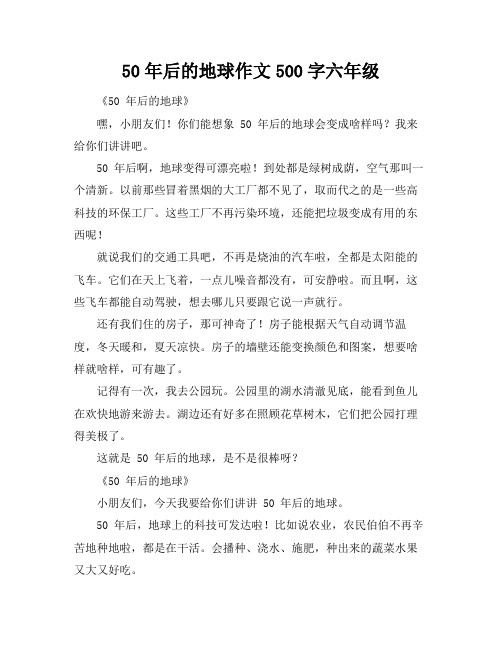
50年后的地球作文500字六年级《50 年后的地球》嘿,小朋友们!你们能想象 50 年后的地球会变成啥样吗?我来给你们讲讲吧。
50 年后啊,地球变得可漂亮啦!到处都是绿树成荫,空气那叫一个清新。
以前那些冒着黑烟的大工厂都不见了,取而代之的是一些高科技的环保工厂。
这些工厂不再污染环境,还能把垃圾变成有用的东西呢!就说我们的交通工具吧,不再是烧油的汽车啦,全都是太阳能的飞车。
它们在天上飞着,一点儿噪音都没有,可安静啦。
而且啊,这些飞车都能自动驾驶,想去哪儿只要跟它说一声就行。
还有我们住的房子,那可神奇了!房子能根据天气自动调节温度,冬天暖和,夏天凉快。
房子的墙壁还能变换颜色和图案,想要啥样就啥样,可有趣了。
记得有一次,我去公园玩。
公园里的湖水清澈见底,能看到鱼儿在欢快地游来游去。
湖边还有好多在照顾花草树木,它们把公园打理得美极了。
这就是 50 年后的地球,是不是很棒呀?《50 年后的地球》小朋友们,今天我要给你们讲讲 50 年后的地球。
50 年后,地球上的科技可发达啦!比如说农业,农民伯伯不再辛苦地种地啦,都是在干活。
会播种、浇水、施肥,种出来的蔬菜水果又大又好吃。
我们穿的衣服也不一样了。
衣服可以根据我们的心情变换颜色和款式。
如果今天心情好,衣服就会变得鲜艳漂亮;要是心情不好,衣服就会变成柔和的颜色安慰我们。
再看看城市,到处都是高楼大厦,但是这些大楼都有自己的“花园”,种满了各种各样的植物。
有一次我走在大街上,抬头一看,满眼都是绿色,感觉就像在森林里一样。
而且啊,50 年后人们都特别爱护环境。
大家不再乱扔垃圾,都知道要把垃圾分类,让垃圾变成资源。
小朋友们,你们喜欢 50 年后的地球吗?。
50年后的地球作文450字左右
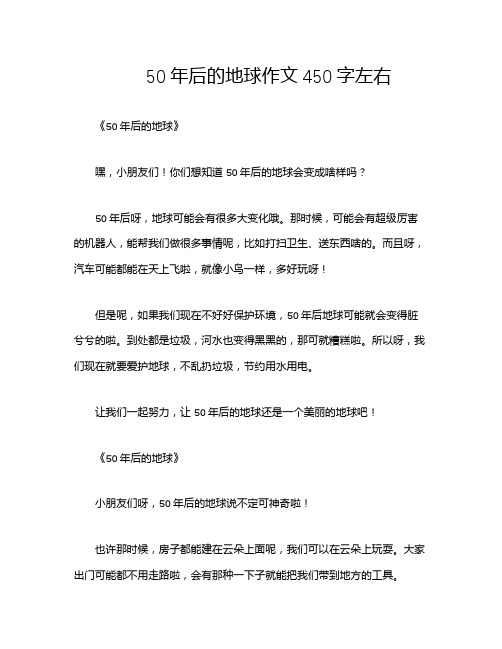
50年后的地球作文450字左右
《50 年后的地球》
嘿,小朋友们!你们想知道 50 年后的地球会变成啥样吗?
50 年后呀,地球可能会有很多大变化哦。
那时候,可能会有超级厉害的机器人,能帮我们做很多事情呢,比如打扫卫生、送东西啥的。
而且呀,汽车可能都能在天上飞啦,就像小鸟一样,多好玩呀!
但是呢,如果我们现在不好好保护环境,50 年后地球可能就会变得脏兮兮的啦。
到处都是垃圾,河水也变得黑黑的,那可就糟糕啦。
所以呀,我们现在就要爱护地球,不乱扔垃圾,节约用水用电。
让我们一起努力,让 50 年后的地球还是一个美丽的地球吧!
《50 年后的地球》
小朋友们呀,50 年后的地球说不定可神奇啦!
也许那时候,房子都能建在云朵上面呢,我们可以在云朵上玩耍。
大家出门可能都不用走路啦,会有那种一下子就能把我们带到地方的工具。
可是呀,如果我们现在总是浪费资源,50 年后地球可能就没有那么多好玩的东西啦。
比如没有足够的水给我们洗澡,没有电让我们看电视。
那多无聊呀!
所以呢,我们从现在开始,就要好好保护地球妈妈哦,这样 50 年后的地球才会更好玩更有趣呀!。
50年后的地球_想象作文
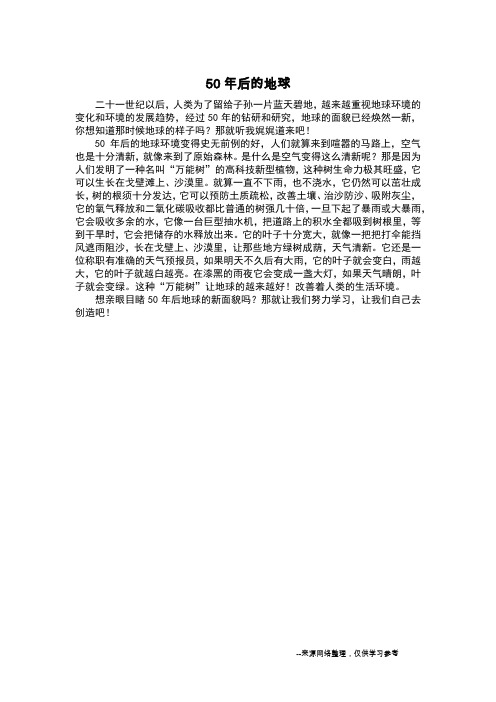
50年后的地球
二十一世纪以后,人类为了留给子孙一片蓝天碧地,越来越重视地球环境的变化和环境的发展趋势,经过50年的钻研和研究,地球的面貌已经焕然一新,你想知道那时候地球的样子吗?那就听我娓娓道来吧!
50年后的地球环境变得史无前例的好,人们就算来到喧嚣的马路上,空气也是十分清新,就像来到了原始森林。
是什么是空气变得这么清新呢?那是因为人们发明了一种名叫“万能树”的高科技新型植物,这种树生命力极其旺盛,它可以生长在戈壁滩上、沙漠里。
就算一直不下雨,也不浇水,它仍然可以茁壮成长,树的根须十分发达,它可以预防土质疏松,改善土壤、治沙防沙、吸附灰尘,它的氧气释放和二氧化碳吸收都比普通的树强几十倍,一旦下起了暴雨或大暴雨,它会吸收多余的水,它像一台巨型抽水机,把道路上的积水全都吸到树根里,等到干旱时,它会把储存的水释放出来。
它的叶子十分宽大,就像一把把打伞能挡风遮雨阻沙,长在戈壁上、沙漠里,让那些地方绿树成荫,天气清新。
它还是一位称职有准确的天气预报员,如果明天不久后有大雨,它的叶子就会变白,雨越大,它的叶子就越白越亮。
在漆黑的雨夜它会变成一盏大灯,如果天气晴朗,叶子就会变绿。
这种“万能树”让地球的越来越好!改善着人类的生活环境。
想亲眼目睹50年后地球的新面貌吗?那就让我们努力学习,让我们自己去创造吧!
--来源网络整理,仅供学习参考。
50年后的地球

50年后的地球50年后的地球象山丹城第三小学601班姓名:邵慈航“快睡觉了!都11点了!”妈妈的声音从客厅传来。
此刻,在床上已经睡得迷迷糊糊的我,应了一声,就沉沉地睡过去了······一睁开眼睛,我就发现我来到了大街上,看了看自己手上戴着的电子手表,上面显示着2064年9月8日。
“我难道穿越时空,到达了50年后的未来的象山县了吗?”我喃喃自语着,“算了,管他三七二十一,先观赏一下未来的象山县是怎么样的吧!”我一边走一边环顾四周,抬头一看,整个城市都被罩在一个大大的玻璃罩子里,好像在温室里一样。
我发现,在2064年,人类已经发明出了智能汽车,不会再排放出尾气污染环境。
只见马路两旁的房子的形状很是奇特:大都是海里的各种动物和鱼类的形状,有海豚形状的学校、鲨鱼形状的商场、海星形状的房屋、贝壳形状的体育馆、海象形状的博物馆、鲸鱼形状的歌舞厅······整个城市都被这些奇形怪状的建筑物装点得十分美观。
街道十分整洁,2064年的人们从不随地乱扔垃圾,都是自带垃圾袋,把垃圾装进垃圾袋子里。
走进一处大型公园,周围堆了很多的假山,种了各种各样的海藻和海草,还有五颜六色的珊瑚树,真是令人目不暇接啊!深吸一口气,我觉得2064年的空气也比2014年的空气清新的多得多。
看着看着,我的肚子开始“咕咕”叫了,我想:要不先去买点东西填填肚子吧!来到小卖部,我惊奇的发现有一种食物叫做“变大变小丸”,我向小卖部老板询问:“老板,这个东西为什么叫‘变大变小丸’呢?”小卖部老板对我解释道:“你应该是外来人吧!这个‘变大变小丸’吃下去后在心里默念‘变大’或者‘变小’,你的整个身体就会随之变大或者变小,并且只有在我们象山市才有得卖,独一无二,享誉世界。
”“哦,原来是这样啊!”从小卖部老板说的话中,我知道了“变大变小丸”的妙用,还顺便知道了象山县已经变成了象山市,真令我的家乡而感到高兴。
五十年后的地球作文(优秀7篇)
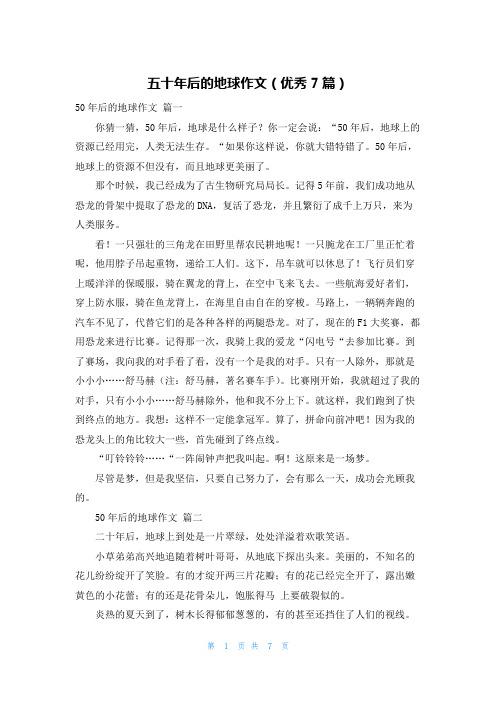
五十年后的地球作文(优秀7篇)50年后的地球作文篇一你猜一猜,50年后,地球是什么样子?你一定会说:“50年后,地球上的资源已经用完,人类无法生存。
“如果你这样说,你就大错特错了。
50年后,地球上的资源不但没有,而且地球更美丽了。
那个时候,我已经成为了古生物研究局局长。
记得5年前,我们成功地从恐龙的骨架中提取了恐龙的DNA,复活了恐龙,并且繁衍了成千上万只,来为人类服务。
看!一只强壮的三角龙在田野里帮农民耕地呢!一只腕龙在工厂里正忙着呢,他用脖子吊起重物,递给工人们。
这下,吊车就可以休息了!飞行员们穿上暖洋洋的保暖服,骑在翼龙的背上,在空中飞来飞去。
一些航海爱好者们,穿上防水服,骑在鱼龙背上,在海里自由自在的穿梭。
马路上,一辆辆奔跑的汽车不见了,代替它们的是各种各样的两腿恐龙。
对了,现在的F1大奖赛,都用恐龙来进行比赛。
记得那一次,我骑上我的爱龙“闪电号“去参加比赛。
到了赛场,我向我的对手看了看,没有一个是我的对手。
只有一人除外,那就是小小小……舒马赫(注:舒马赫,著名赛车手)。
比赛刚开始,我就超过了我的对手,只有小小小……舒马赫除外,他和我不分上下。
就这样,我们跑到了快到终点的地方。
我想:这样不一定能拿冠军。
算了,拼命向前冲吧!因为我的恐龙头上的角比较大一些,首先碰到了终点线。
“叮铃铃铃……“一阵闹钟声把我叫起。
啊!这原来是一场梦。
尽管是梦,但是我坚信,只要自己努力了,会有那么一天,成功会光顾我的。
50年后的地球作文篇二二十年后,地球上到处是一片翠绿,处处洋溢着欢歌笑语。
小草弟弟高兴地追随着树叶哥哥,从地底下探出头来。
美丽的,不知名的花儿纷纷绽开了笑脸。
有的才绽开两三片花瓣;有的花已经完全开了,露出嫩黄色的小花蕾;有的还是花骨朵儿,饱胀得马上要破裂似的。
炎热的夏天到了,树木长得郁郁葱葱的,有的甚至还挡住了人们的视线。
花儿在草地上和小草弟弟玩耍,蝴蝶评委看着他们的舞蹈,笑得连肚子都疼了。
不知不觉中,小草弟弟在阳光伯伯的呵护下,慢慢的,慢慢的,换上了一件深绿色的衣裳。
50年后的地球英语作文七年级100词
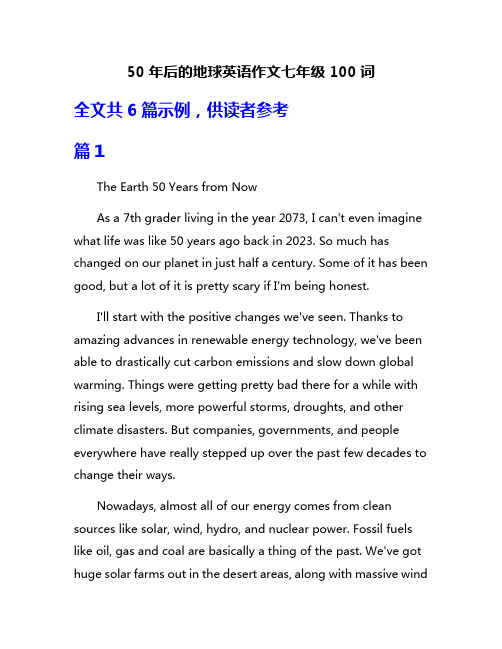
50年后的地球英语作文七年级100词全文共6篇示例,供读者参考篇1The Earth 50 Years from NowAs a 7th grader living in the year 2073, I can't even imagine what life was like 50 years ago back in 2023. So much has changed on our planet in just half a century. Some of it has been good, but a lot of it is pretty scary if I'm being honest.I'll start with the positive changes we've seen. Thanks to amazing advances in renewable energy technology, we've been able to drastically cut carbon emissions and slow down global warming. Things were getting pretty bad there for a while with rising sea levels, more powerful storms, droughts, and other climate disasters. But companies, governments, and people everywhere have really stepped up over the past few decades to change their ways.Nowadays, almost all of our energy comes from clean sources like solar, wind, hydro, and nuclear power. Fossil fuels like oil, gas and coal are basically a thing of the past. We've got huge solar farms out in the desert areas, along with massive windturbine fields both on land and offshore. Plus, new nuclear plants are a million times safer than the old ones and generate tons of emission-free electricity. My family's house, like every other one, has solar panels on the roof to capture energy from the sun.Electric and hydrogen-powered vehicles have also totally replaced the gas guzzlers of the past. I can't even imagine how polluted and smoggy cities must have been with everyone driving those old combustion engine cars and trucks. Getting rid of vehicle emissions has dramatically improved air quality worldwide. We can actually see the blue skies again! Not only that, but the rise of autonomous self-driving cars andon-demand transport services has cut down a huge amount of traffic jams and accidents. Getting around is so much easier and safer now.Another major positive change has been the booming development of plant-based meat alternatives and sustainable high-tech farming practices. This has allowed us to feed the growing global population in an environmentally friendly way without destroying even more forests and wrecking the land with cattle production. The veggie burgers, chicken nuggets and other mock meats we eat actually taste really good and are super healthy too. And vertical indoor farming using hydroponics andaeroponics provides fresh produce for cities without taking up a lot of space.On the technology side, the rise of artificial intelligence, robotics, and human-machine integration has been pretty wild to witness. AI assistants like Siri and Alexa from half a century ago seem laughably primitive compared to the ultra-intelligent AI we have access to now. Modern AI can understand us in complex ways, learn and expand its own knowledge, be incredibly creative in areas like art and inventions, and basically assist humans with just about any task we need. Some people are even exploring melding their minds with AI to enhance human intelligence and cognition.Likewise, robots have gone from basic machines that could only carry out simple programmed routines to highly autonomous droids that can adapt to fluid situations and even develop self-awareness and general intelligence capabilities. Some humanoid robot assistants are getting harder to distinguish from real people. Robot workers have also taken over most physical labor and dangerous jobs that humans don't want to do.Overall, technology has brought us incredible advances in convenience, productivity, automation and quality of life. Smarthomes, self-driving cars, AI assistants, virtually no more physical work required - the list goes on. In many ways, the future predicted by science fiction is already here.But it hasn't been all good news and sunshine over the past 50 years - not by a long shot. In fact, I have to admit that I'm pretty scared about the fate of humanity and planet Earth.The global population has absolutely exploded to over 10 billion people, putting a terrible strain on resources and creating massive crowds everywhere you go. Poverty, hunger, disease, lack of clean water - these humanitarian crises have only grown worse in many parts of the globe despite our best efforts. Income inequality has spiraled out of control too, with a tiny handful of corporations, nations and individuals controlling the vast majority of the world's wealth and resources.That disparity is leading to huge social unrest, conflict between nations over dwindling resources, mass migrations of refugee populations fleeing famine and violence, and a general breakdown of order in some regions. Many wars have already been fought over water and land shortages. If current trajectories hold, it's only going to get uglier.Then there's the fact that ecosystems and biodiversity have been utterly devastated on an apocalyptic scale over the last 50years. Despite our best efforts at conservation, the sad reality is that continuing human development and pollution has put a massively unsustainable level of strain on the natural world. It's estimated that well over half of all plant and animal species that existed in 2023 are now extinct - gone forever. Rainforests have been pulverized. Oceans have been overfished into near-barren wastelands. Plastic and chemical contamination is chokingwhat's left of the natural world.This environmental and ecological collapse is setting the stage for a worst-case scenario that scientists have warned about for decades - an utter biosphere meltdown and climate changes so extreme that they make large swaths of the Earth completely uninhabitable to humans and most other life forms. Mass crop failures, water shortages, increasingly severe storms and other climate disasters are already happening. They threaten to cause incalculable famine, disease, and suffering for billions across the globe. I try not to think about these truly apocalyptic possibilities, but it's hard not to feel a sense of dread about the near future if we can't get things under control.Even in my own community, which is relatively affluent and stable compared to many others, the impacts of the environmental crisis are evident. Our air quality frequently getsso bad from pollution and particulates that we have to stay indoors with oxygen masks and air filters running. Worsening heat waves and lack of water mean we can't go outside for extended periods without risking heat stroke or dehydration. And we can't even swim in the ocean anymore due to toxins and bacteria from contaminated runoff and marine dead zones.What does the future hold for humanity and our planet over the next 50 years if we stay on this trajectory? It's hard for me to say, but I don't think it will be anything good. Either we'll finally wake up and take the drastic actions necessary to reverse these negative trends, investing the technology and resources to establish a truly sustainable and equitable civilization in balance with nature. Or we'll continue blindly consuming and destroying everything around us until we've squeezed every last drop out of this world and rendered it uninhabitable for our species.I try to remain hopeful that my generation can turn things around and create a future where both humanity and the natural world can thrive together on this tiny, fragile planet we call home. But the honest truth is that the outlook seems incredibly grim if we do nothing to change course. When I think about the relatively pristine and resource-abundant Earth that existed 50 years ago in 2023, it's hard not to be disgusted by how badlywe've screwed things up since then. I can only hope that our mistakes and negligence serve as a harsh wake-up call so that 50 years from now, the next generation isn't looking back in anger and despair at how we only made things even worse.篇2The Earth 50 Years From NowWhat will the Earth be like 50 years into the future? As a 7th grader, I can only imagine based on what I've learned in school and from watching the news. A lot can change in half a century, but I fear many of the environmental issues we are grappling with today will still be major challenges unless we take bold action.One of the biggest threats to the planet is climate change caused by greenhouse gas emissions from burning fossil fuels like coal, oil and natural gas. Scientists warn that if we don't get these emissions under control soon, extreme weather events like hurricanes, droughts, wildfires and floods will become even more frequent and intense. Polar ice caps and glaciers are already melting at alarming rates, causing sea levels to rise. If this continues unabated, many coastal cities and even entire islands could wind up underwater by the time I'm a senior citizen.Another major issue is pollution, which is contaminating our air, water and soil. Plastics are choking our oceans, killing fish and other marine life. Toxic chemicals from factories and farms are seeping into rivers, lakes and groundwater that people rely on for drinking water. Smog from vehicle emissions and industrial activities is making the air unsafe to breathe in many major cities. If we don't clean up our act, the Earth could become an unhealthy, inhospitable place in 50 years.Then there's the rapid loss of biodiversity as forests are cleared for agriculture and urban development, pushing countless plant and animal species to the brink of extinction. If this mass die-off continues, the complex web of life that is so essential for our own survival could completely unravel. I can't even imagine a world without the rich variety of living creatures we currently share the planet with.But I don't want to be too much of a downer here. I also think there are many reasons to be hopeful that we can turn things around and create a cleaner, greener, and healthier Earth 50 years from now. For one, renewable energy sources like solar and wind power are rapidly getting cheaper and more efficient, allowing us to gradually transition away from dirty fossil fuels.New technologies for things like carbon capture, energystorage, smart grids and green transportation are being developed all the time.Secondly, more and more people are becoming environmentally conscious, changing their consumption habits and demanding action from government and business leaders to tackle issues like climate change and pollution. Maybe by the time I'm an adult, products and services that are bad for the environment will be heavily taxed or banned while sustainable alternatives are incentivized and embraced by the mainstream.Young people like me are fired up to tackle these issues as well. I really think our generation could be the one that pushes society over the sustainability tipping point and fundamentally reshapes humanity's relationship with the natural world in a positive way.Education about environmental stewardship seems to be a top priority these days, so hopefully by the 2070s humans will have a much deeper appreciation for nature's delicate balance. Maybe we'll be living in cleaner, energy-efficient smart cities integrated with the landscape instead of urban sprawl consuming any greenery in sight. Our transportation could be fully electrified and automated, sharply cutting emissions. Neweconomic models may have emerged that prioritize sustainable growth over endless wasteful consumption.But even if things are better 50 years from now, I'm sure there will still be environmental challenges that people then will need to stay on top of. The work of safeguarding our one and only home planet is never finished. Either way, I plan to do my part by making sustainable choices in my own life and supporting leaders and innovators working toward a greener future. With awareness and collective effort, I'm hopeful my grandkids can grow up experiencing the wonders of nature like I did instead of living on a degraded, polluted planet. Only time will tell what the Earth actually looks like 50 years down the road.篇3What Will Earth Be Like 50 Years From Now?By Claude, 7th Grade StudentCan you imagine what life on Earth will be like in 50 years? It's crazy to think about how much could change in just half a century! Based on the way technology has been advancing and the big problems facing our planet, I have some ideas about what the world may look like when I'm an old person in 2073.First off, I think robots and artificial intelligence (AI) will be everywhere and do a lot of jobs currently done by humans. We already have robots building cars, virtual assistants like Siri and Alexa, and computers that can beat humans at chess and go. In 50 years, AI may be smart enough to be our teachers, doctors, scientists, and more. Robots could cook our meals, clean our homes, drive our cars, and make a lot of stuff in factories. This could make life easier by automating hard labor, but it may also cause lots of people to lose their jobs to machines.Another big change will probably be how we get our energy and Sources of natural resources. Hopefully we'll finally be using solar, wind, and other renewable energy Sources instead of burning oil, gas and coal which are bad for the environment. Maybe by 2073 we'll have huge篇4The Earth in 50 YearsI've been asked to write about what I think the Earth will be like in the year 2073 when I'm an old person of 63 years old. To be honest, I'm really worried about the future of our planet. My teachers and parents are always talking about climate change, pollution, overpopulation and other environmental problems weare facing today. If we don't make some big changes soon, I'm afraid the Earth is going to be in really bad shape 50 years from now.One of the biggest issues is going to be climate change caused by global warming. The polar ice caps are already melting at a really fast rate due to rising temperatures. If this continues, sea levels are expected to rise dramatically over the next few decades. By 2073, many coastal cities around the world may be partially or completely flooded and uninhabitable. Places like New York, Miami, Venice, Shanghai and many island nations could be underwater or have to build enormous sea walls to hold back the oceans. Millions of people would become climate refugees, forced to flee their homes and relocate.Weather is also projected to become much more extreme and unpredictable due to climate change. The past few years have seen devastating hurricanes, wildfires, droughts, heat waves and other natural disasters that seem to be getting worse. In 2073, these extreme weather events could become the norm rather than the exception. We may experience summers with temperatures over 120°F (49°C), winters with incredible amounts of snowfall, more powerful tornadoes and hurricanes, and droughts that last for years. If we are unable to reverse climatechange, life is going to become much harder and more dangerous.Pollution is another major crisis the Earth could be facing 50 years from now. Already today, there is plastic waste choking the oceans, toxins being released into the air and water, and litter contaminating nature. If we don't get pollution under control, the planet could become even more of a mess in the future. The air might become unbreathable in some major cities due to smog. The oceans could be full of plastic and other garbage, killing marine life. And the lands could be covered in toxic industrial waste and runoff. Cleaning up all this pollution may be an overwhelming task that requires cooperation from every country.Overpopulation is also a huge concern for the Earth's future. Right now there are nearly 8 billion people on the planet, with that number continuously growing. In 50 years, the population could increase to over 10 billion if current trends continue. That means far more demand for food, water, housing, transportation, energy and other resources. It will put even more strain on the environment. There may not be enough farms to grow enough food or sources of clean drinking water for everyone. Cities willbecome even more overcrowded and poverty could increase. Overpopulation could lead to conflicts over scarce resources.Then there are issues like deforestation that could worsen in the coming decades. Already, huge portions of the world's rainforests have been burned and cleared, especially in places like the Amazon region. By 2073, will there be any rainforests left with the way things are going? Deforestation contributes to climate change, causes loss of biodiversity as animal habitats are destroyed, disrupts ecosystems, and eliminates a key source of the world's oxygen supply. Our forests could be gone or on the verge of extinction in the next 50 years.Something must also be done about overpopulation through education, family planning services and policies to stabilize population growth in different countries. We need to protect what's left of the rainforests and other ecosystems and do more to preserve plant and animal species篇5The Earth in 50 YearsI can only imagine what the Earth will look like 50 years from now. So much has changed already in my short lifetime, and technology seems to be advancing at an unbelievable pace. I'mexcited but also a little nervous about all the potential changes that could happen to our planet in the next half century.One of the biggest issues we're facing right now is climate change caused by human activities like burning fossil fuels and deforestation. Unless we take really drastic actions soon, scientists warn that global temperatures will keep rising, causing more extreme weather, rising sea levels that could flood coastal cities, loss of species, and other devastating impacts.I really hope that in 50 years, we've finally gotten serious about using clean, renewable energy sources like solar, wind, and nuclear power instea篇6Earth 50 Years from NowBy Claude, 7th Grade StudentWhat will our planet look like half a century from now? So much can change in 50 years. Just think about how different the world is today compared to 1973! Back then, there was no internet, no smartphones, and most homes didn't even have a computer. Who could have predicted things like social media, streaming video, or video calls?In the year 2073, the Earth's landscape and environment will likely be drastically different than today. Some of the changes will be positive due to technological advances and increased environmental awareness. But if we aren't careful, the negative changes caused by pollution, overconsumption, and climate change could make Earth an unpleasant or even uninhabitable place.One of the biggest changes we'll likely see is the continuing rise of renewable energy sources like solar, wind, and geothermal power. Hopefully, by 2073, most of the world will have transitioned away from fossil fuels toward clean energy. Our cities may be powered by huge solar farms surrounding urban areas or wind turbines lining the coasts. Our homes could have solar shingles and battery storage for electricity.Transportation should be much moreenvironmentally-friendly in 50 years too. We'll probably see many more electric and hydrogen-powered vehicles on the roads, perhaps even self-driving cars! Cargo ships and planes may run on advanced biofuels or portable nuclear reactors. Our public transit systems could expand with more electric buses, trains, and hyperloop systems for fast cross-country travel.With cleaner energy and transportation, our air quality should improve dramatically. We may finally be able to solve issues like smog blanketing major cities. The ozone layer that protects us from the sun's radiation could also recover as we phase out ozone-depleting chemicals. Breathing fresh air may no longer be a novelty!However, not all the changes to our planet's environment will be positive. Climate change is already having devastating impacts that will likely intensify over the next 50 years. Sea levels are predicted to rise by 1-4 feet on average, submerging many coastal cities like Miami, Venice, and Jakarta. Extreme weather events like hurricanes, wildfires, droughts, and heatwaves will probably occur more frequently.The consequences could include mass human migration away from uninhabitable regions, severe food and water shortages, and the extinction of 30% of plant and animal species. The Great Barrier Reef and other coral reef ecosystems may be completely destroyed by ocean acidification and warming waters. We could lose entire island nations like the Maldives or Marshall Islands to rising seas.Melting polar ice caps and glaciers will contribute to sea level rise but also wreak havoc through flooding river valleys andlow-lying areas. At the poles, the loss of ice will remove habitats for species like polar bears, seals, and penguins. Weather patterns will become more erratic as the difference between the poles and equator decreases.To preserve a livable planet, we'll likely need to develop ways to remove excess carbon dioxide from the atmosphere through carbon capture technology or atmospheric seeding. We may even attempt geoengineering solutions like sun shields to reduce solar radiation. Parks, forests, and undeveloped land will become even more precious for protecting biodiversity and natural carbon sinks.Our diet and agriculture will also transform in 50 years, out of necessity as well as innovation. Vertical indoor farming could become the norm, with crops growing in controlled environments to boost yields and reduce need for land, fertilizers, and pesticides. New genetically-edited crops tailored for growing vertically or under LED lights may be commonplace.We'll also probably shift away from meat production, as livestock is a major source of greenhouse gas emissions.Plant-based alternatives like the Impossible Burger today could become the mainstream "meat" of the future. Perhaps we'll evenbe consuming proteins from an emerging industry of insect farming or lab-grown meat from animal cells.Some aspects of daily life may seem familiar in 2073, like shopping at the mall, watching movies, going to concerts, or playing sports and video games. But even simple things could change drastically with the integration of immersive virtual and augmented reality. We may eventually spend more time in fantastic digital worlds than the physical one!Schools and workplaces will certainly look different with new learning and productivity tools powered by artificial intelligence. Perhaps AI companions like Claude will be as common as smartphones are today! Advances in robotics, 3D printing, biotechnology, and nanotechnology may also reshape every industry.While I'm excited by the prospect of technological progress raising our quality of life, I worry about the fate of the natural world and humanity's stewardship of the planet so far. If we pollute the air, soil, and water to an extreme, is any advancement worth living in a degraded environment?In 50 years, I hope we've turned things around for the better.I dream of a world with clear skies, plastic-free oceans, and flourishing ecosystems. A world committed to sustainability,where we live in harmony with nature instead of destroying it. Where all people have access to clean water, healthy food, and a stable climate.We still have time to make the right choices. Our planet's future rests on the actions we take today. Earth is our one and only home. Together, we must take care of it so that 50 years from now, it remains a wonderful world worth living in. For our sake, and for the sake of future generations.。
- 1、下载文档前请自行甄别文档内容的完整性,平台不提供额外的编辑、内容补充、找答案等附加服务。
- 2、"仅部分预览"的文档,不可在线预览部分如存在完整性等问题,可反馈申请退款(可完整预览的文档不适用该条件!)。
- 3、如文档侵犯您的权益,请联系客服反馈,我们会尽快为您处理(人工客服工作时间:9:00-18:30)。
50年后的地球
你看到过山吗?山是碧绿的,你看过海吗?海是纯净的,你看过天空吗?天空是湛蓝的,曾几何时这些都像越走越远的回忆,只是回忆。
干净的天空已经远离,我们人类还在原地回首。
黑黑的、发臭的河水,光秃秃的山,天空飘着的不再是那洁白的云,而是乌烟瘴气,以前那蔚蓝的天空也变成了黑压压的。
50年前,地球还是个绿树成荫的好地方。
可是由于人类的贪心,把森林变成了荒地。
世界上的森林大片大片地被砍光,沙漠化越来越严重。
可人类却还不知觉悟,还在砍伐树木,把茂密的森林变成荒地,直到把世界上的所有树木全部砍光为止。
人类将树木砍光之后,又把目标放在了煤矿等自然资源上。
人们在世界各地用挖矿机等机械工具挖地底下的煤、矿物、石油等自然资源。
人类不加节制的开采自然资源。
曾有一些人出来反对那些人,不过这些正义人士都被抓进监狱。
人类还一批一批地把开采自然资源的机械发往世界各地。
没有多久世界上的各种资源都被开采枯竭了。
人类有了钱之后,大量生产汽车和一些工具。
一些工厂将废气和废水都乱排乱放,令原本清澈的河水都变成了浑浊、发臭的脏水,空气也变的臭熏熏的。
汽车被大量生产出来之后,每家每户都买了车。
千千万万的车在大街上行驶。
尾气乱放,造成全球天气变暖。
地球在那段时间的平均气温高达40度。
南北极的冰都融化了,把一些海平面低的地域都给淹没了。
臭氧层的空洞也大了起来,人们都患上了皮肤病。
难道真的要等到地球离我们远去才知道后悔,再来回忆吗?我们已经收到了地球的警告信,让我们认真的对待这封警告信。
不要等到最后只有人类在唱独角戏,在懊悔,在痛苦。
作者:大东坝镇校阙诺铭指导老师:兰惠芬。
